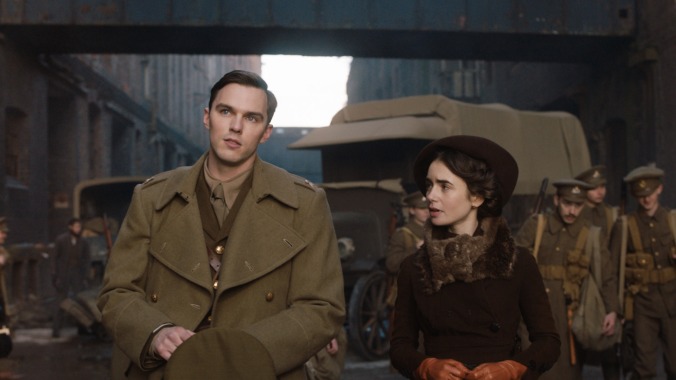Tolkien gives the Hobbit author his own Shakespeare In Love, minus the laughs


It takes approximately three minutes before the image of a ring is reflected, however faintly, in the eyes of J.R.R. Tolkien (Nicholas Hoult) in, yes, Tolkien, the biographical drama that threatens to do for the author of Lord Of The Rings what the short spoof George Lucas In Love did for the creator of Star Wars—only straight-faced this time. The real model here, of course, is Shakespeare In Love, but that movie was also a comedy, while Tolkien is as reverent and moist-eyed as a Peter Jackson goodbye scene.
Yet as unpromising as the movie is when presenting the get-this notion that Tolkien, much like his hobbit characters, also had a group of friends (a “fellowship,” if you will), there is something compelling about its attention to the school-clique dynamics linking “Ronald” Tolkien (Hoult) to Geoffrey (Anthony Boyle), Christopher (Tom Glynn-Carney), Robert (Patrick Gibson), and his future wife, Edith (Lily Collins). Tolkien doesn’t lean too heavily on gifted-genius or Great Man tropes, instead suggesting that all four boys (and Edith, who Tolkien initially squirrels away jealously) were in possession of talent, sensitivity, and ambition. Though the movie can’t resist the opportunity to fawn over Tolkien’s facility with creating languages, his journey to becoming a world-renowned writer is as much an accident of fate as a grand destiny achieved. (The project has already been disavowed sight unseen by the author’s estate as well as a biographer, though whatever liberties it takes seem fairly innocuous.)
The boys meet as tweens at an elite boys’ school, where Tolkien is sent with his younger brother (who hastily disappears from the narrative) after the death of their mother. Tolkien is under the care of Father Francis Morgan (perennial buzzkill Colm Meaney), who takes his responsibility to the boy’s proper—and preferably priestlike—upbringing very seriously, eventually arranging for the lad to take a room in a boarding house. There he meets Edith, who must while away her time playing piano ditties for the owner.
This portion of the story is told in flashback, because J.R.R. Tolkien has to think about his entire life before he fights World War I in France. The war is crucial to the story of Tolkien and his friends, but it’s also where director Dome Karukoski gets most ambitious, and most misguided. As Tolkien attempts to traverse the trenches and rescue one of his friends (turned fellow soldier), Karukoski labors in the shadow of Jackson’s mega-budget imaginings of Tolkien’s work, adding fantastical visual flourishes to reflect Tolkien’s desperate, feverish, terrified state of mind.
Look, it’s appreciated whenever a biopic attempts to bring some visual flair into the proceedings. But the movie’s relationships are more interesting than boilerplate visuals drawing comparisons between flamethrowers and dragons, and the little bits of spectacle will always pale in comparison to even the weaker Peter Jackson adaptations of same. Karukoski’s more swoon-worthy visuals are smaller in scope, like a sweetly daft scene where Tolkien and Edith, denied entry to a performance of Wagner’s Ring cycle, sneak into the venue’s underground tunnels and pantomime to each other as the music plays upstairs. Eventually the camera tracks away from them, leaving them their privacy.
Hoult and Collins make a cute, likable couple, though it must be said that Hoult has begun to resemble a character actor miscast as a leading man. Here he plays some of his emotional scenes staring off into the distance, looking faintly wild-eyed; his vulnerability outshines his charisma. Collins, for her part, has a thin (if charming) character to play. Edith’s principle contribution is helpfully explaining to her nerd suitor, in another get-this moment, that words in fact have meaning. The fellowship boys have group chemistry, but don’t always get to distinguish themselves as individuals. Tolkien is the same way: It’s more entertaining and lighter on its feet than a lot of film biographies, but never fully extricates itself from its genre trappings, wobbling back and forth between human drama and cornball moments where the hero is told how special and remarkable he is. There are times when the Tolkien the character seems more interested in his past than Tolkien the movie does.